While I was at my grandma’s house this week I read Buying In: What We Buy and Who We Are, a fascinating book by Rob Walker. There will be more posts to come in the next few weeks, but for starters, I was struck by the results of a 2006 survey Walker mentions by the Pew Research Center. The survey asked people if various items were luxuries or necessities. Here are the results from 2006 and 1996:
Clearly, over time we’re defining more and more items as necessities rather than luxuries:
A breakdown of some results by age:
If I had to guess, I’d think the fact that younger people are less likely to say a TV is a necessity than older people is due not to less concern about TV but more willingness to watch content online. Does that seem reasonable? Other explanations?
The survey found that the higher a person’s income, the more items they define as a necessity:
The biggest differences by income were for dishwashers, cell phones, computers, and high-speed internet, which are more likely to be defined as a necessity as income increases.
The Pew Center’s website has links to more detailed breakdowns, as well as full info on the question wording, methodology, etc. And as the authors say in the summary, the results show only a one-way change: in no case did they find that the overall percent defining something as a necessity decreased between 1996 and 2006. As they put it,
The old adage proclaims that “necessity is the mother of invention.” These findings serve as a reminder that the opposite is also true: invention is the mother of necessity. Throughout human history, from the wheel to the computer, previously unimaginable inventions have created their own demand, and eventually their own need.
The income data would seem to back this up: what we have, we often come to define as necessities.
I would love to see an international comparison of some sort. I’ll see what I can find.
UPDATE: I haven’t found an international comparison yet, but I discovered that the Pew Research Center conducted the survey again in 2009 to see if attitudes had changed during the recession. Quite a striking change for several items:
d

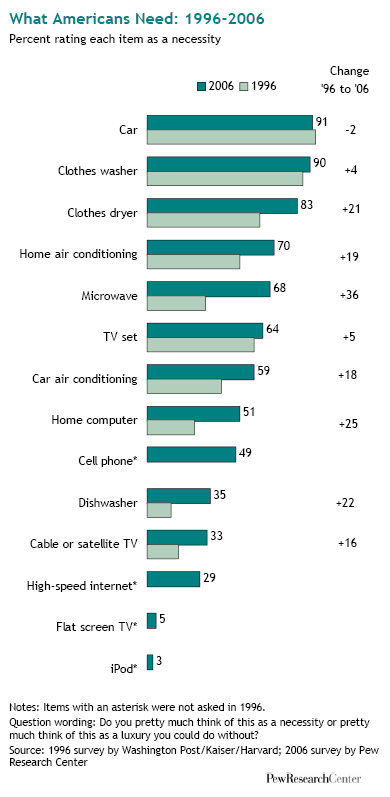
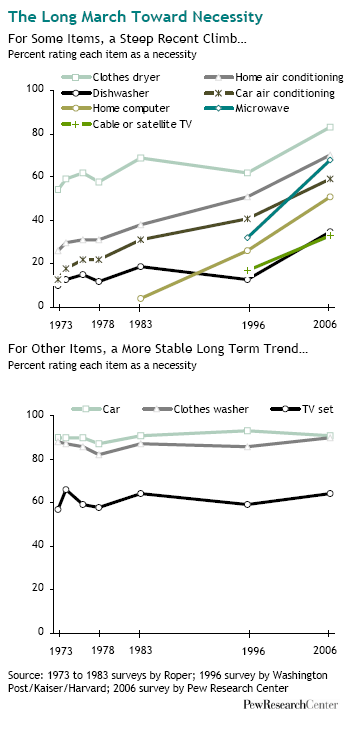
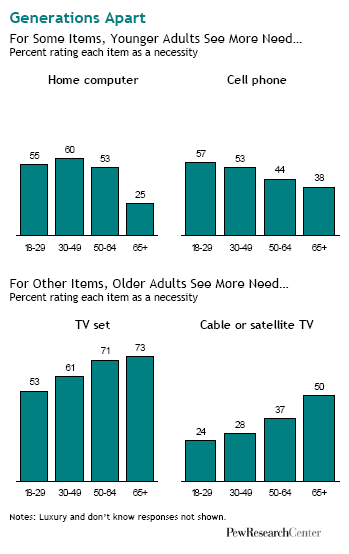
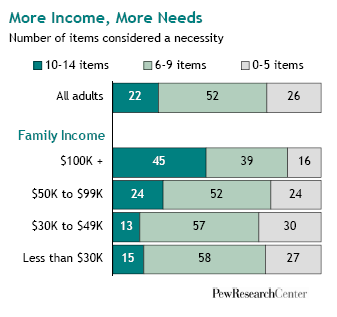
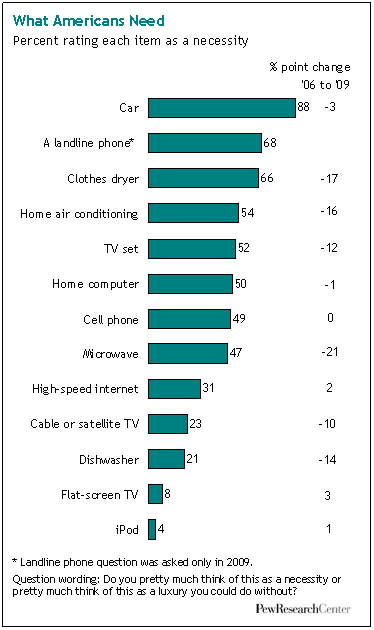
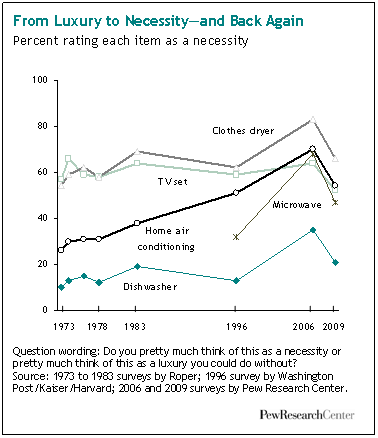
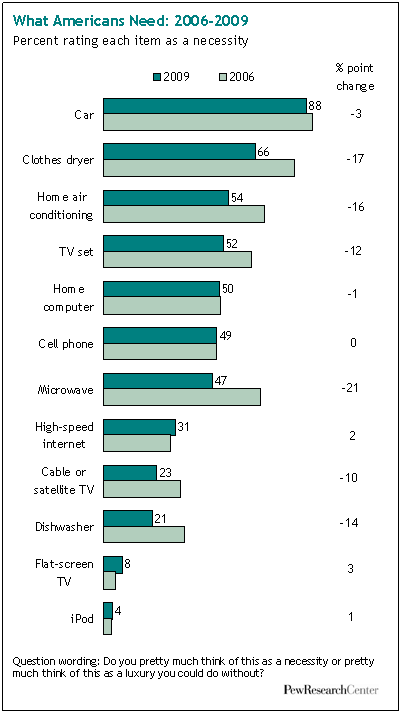
Comments 61
Ms. Marx — June 13, 2010
just a quick comment on cell phones... I wish it wasn't a necessity, but many daycares in my city will not accept children unless their parents have a cell phone so they can be reached all the time. When I was a child, work and grandparents phone numbers were sufficient.
Jayn — June 13, 2010
I suspect computers, cell phones and internet are more likely to be necessities among higher incomes partly due to differing job needs. Someone at the higher ranks of a corporation may use them for telecommuting--the cashier at McDonald's, not so much.
Leslee Beldotti — June 13, 2010
The necessity for air conditioning depends greatly upon where you live.
When I first moved from Chicago to Austin, TX, the air conditioner in my car did not work. In Chicago this didn't matter. But I quickly discovered that in Austin, driving without air conditioning - especially in rush hour traffic - was so miserably hot that I would become nauseous.
Martha — June 13, 2010
Where I live, it is extremely difficult to hold down a job without a car, and we actually have designated air conditioned sanctuaries for the homeless during the summer, because the heat here can kill.
Cell phones depend on the kind of work you do. I certainly could not do my business without mine.
AR — June 13, 2010
Even a steady food supply falls under this. As long as you get enough food overall to avoid starvation, you'd be meeting your necessities in the eyes of many people throughout human history, but now we consider it a form of poverty to have to skip meals. On the other hand, people somehow regard advanced medical care as a necessity despite it having been invented just recently, but rather than waiting for it to be developed over time to the point where it is affordable to most people, everyone feels like their rights are being violated if they don't have access to it the moment is hits the market.
As Ludwig von Mises, said, "The luxury of today is the necessity of tomorrow. Every advance first comes into being as the luxury of a few rich people, only to become, after a time, an indispensable necessity taken for granted by everyone. Luxury consumption provides industry with the stimulus to discover and introduce new, things. It is one of the dynamic factors in our economy. To it we owe the progressive innovations by which the standard of living of all strata of the population has been gradually raised."
Jadehawk — June 13, 2010
let's see... from that list I don't own: a TV set (and therefore no cable/satelite, and no flatscreen), no cellphone, no dishwasher, no ipod. I technically don't own the washer/dryer either, but they're part of the apartment complex, and i use them as if I owned them; I own a car, but don't use it (it's been broken for several months now)
Things I do have but could do without: the aforementioned car; the dryer; the microwave; if I'm really hard-pressed, I could go without AC, too; but I don't wanna :-p
the clothes washer, and the computer + high-speed internet are the only thing I absolutely, definitively need, since the internet's where I earn my money, and I'm absolutely not going to handwash everything I own (though, doesn a laundromat count as not considering a washer a necessity? because then I can imagine going without it) :-)
so, I fit squarely into my wage bracket of (waaay waaay) below $30000 :-p
- - - - - - - - - - -
the thing with AC is... houses used to be built in such a way that they provided a small amount of natural cooling: they stood in the shade of a tree, were made of insulating materials, and could have breezes going thru them. No one builds like that anymore, since the assumption is to use AC. Some places out there, I wouldn't want to live without one in a McMansion!
- - - - - - - - - - -
"If I had to guess, I’d think the fact that younger people are less likely to say a TV is a necessity than older people is due not to less concern about TV but more willingness to watch content online. Does that seem reasonable? Other explanations?"
oh, definitely. I watch netflix or hulu or youtube, and have bought Mad Men from Amazon. so technically I still watch TV, I just don't need a TV set for that anymore :-)
- - - - - - - - - - -
"I would love to see an international comparison of some sort. I’ll see what I can find."
oh, that would be fascinating... clothes dryers seem only now to make inroads in Germany, for example. Only one person in the building my mom lives in has one. The rest hang-dries in the drying cellar.
kevin — June 13, 2010
The question creates a false dichotomy. I regard many of the things on that list as neither necessities nor luxuries, but routine conveniences.
I have high speed internet and computers and the kitchen/laundry appliances, but no tv, air conditioning, car, cell phone, iPod.
Laura — June 13, 2010
Another note on cellphones is that just as a young person is more likely to watch tv on a computer (in lieu of a tv set), we are also more likely to use a cellular phone as our SOLE means of communication. I know many people in their 20's who simply don't have a land line at all.
Chlorine — June 13, 2010
I'm with Jayn on the computer thing. My job (professional digital artist/video game industry) is itself a rather new thing, but because of that, I do require a REALLY incredible computer where some of that other stuff might not be as important. For instance, I haven't watched TV in at least six years and never enjoyed it. All of my friends/nearly everyone I know in my age group (early 20s) considers the television set itself important, but only to hook up the video games to it, not for cable or satellite TV. We watch the occasional movie and YouTube online, but other than that... we play games, draw, and read books and sociology blogs. :)
As for cell phones, Laura has it exactly. It's really weird to find someone who DOES have a home phone any more, it feels very old fashioned and inconvenient. The only ways we have to be contacted are the cell or email, which is either accessed through the cell or on a computer, adding even more necessity to having the computer.
naath — June 13, 2010
I have about half of those things... but to say that they are *necessary* no, I don't think so; not for me anyway.
On the other hand it's clear that social trends are pushing many of these things to be necessary for being socially involved. Friends and employers expect people to be always-contactable by phone and by email (my smart phone is an important part of my social life because I can check email on the run), a lot of people now live so far from their place of work (or indeed from *any* place of work) that living without a car would be very hard if not impossible.
And this doesn't even cover things that have faded into the background now, but which 100 years ago most people wouldn't have had - bank accounts for instance.
Oldarney — June 13, 2010
Can you imagine an 80yo person without a television. What else is there todo when you don't have or know how to use a computer. Im in the youngest group, I don't have a television.
Erica — June 13, 2010
I agree with the comments regarding cell phones replacing home phones. I don't have a home phone because it is just easier (and cheaper) to use my cell for all calling purposes. That is very common among my peers who are in their late 20s to mid 30s.
I have also seen the regional differences in A/C perception. My family was considered somewhat fancy when we got central A/C back in '89 in Ohio, but it is considered odd to not have that now. When I lived in Texas from '00 to '06, it was a necessity although people usually kept their home A/C set to 80 most of the time rather than go broke from electric bills. In DC, some people are surprised that I can survive with just a small window unit in my bedroom that I run for less than an hour a day most of the time. I'm in a basement unit with bars on the windows, so I have my front window open with a screen much of the time. That is a huge factor. Without those bars, it would be a safety risk to keep my windows open.
I wonder how much super chilly offices lead to perceptions of home A/C being a necessity. My office is often so cold that I lose feeling in my fingers even with long pants and a heavy sweater, so it makes it harder to go home to a place that is 80 degrees or hotter.
I'm in IT, so it is pretty vital that I have both a decent computer at home as well as high speed internet. I have the cheapest cable possible because I do watch a lot of content online. I have thought of not replacing my TV whenever it breaks (it is 10+ years old and not a flatscreen), but I do like having a screen that others can see for DVDs and such.
In line with Ms Marx comment regarding daycares requiring cell phones, many locales are prohibiting outdoor line-drying of clothes which changes the mental math on whether a clothes dryer is a luxury or necessity. I hang up many of my clothes to dry inside my apartment, but I do use the dryer. I picked my apartment partly because it has in-unit washer and dryer since I foster animals and it is just easier to soak the dirty pet towels in my own washer.
I don't have a dishwasher because my kitchen is just too small (even my fridge is an under-the-counter model), and I live in a place where I can easily get around without a car. I sold my car almost 4 years ago, but I have recently started considering buying one again to help with the animal rescue work that I do. Affordable exotics vets are often located far from the bus and train lines.
Where my parents live in Ohio, there is just no way to get around without a car. My sister lives in Austin and could probably get around somewhat without a car if she wasn't often transporting dogs. There are a lot of factors relating to the dismantling of public transit that led to the seeming necessity of cars.
One last thought in this already lengthy comment, I wonder how the shrinking amount of personal time that Americans have is a factor in these perceptions. Many of these items reduce the time it takes to complete chores (microwave, clothes washers and dryers, cars (for some), dishwashers) or make life more comfortable (home and car A/C) and if you work 50-60 hours per week and spend 7-10 hours commuting, then it can seem impossible to spend even more time on chores if you can buy an item that will make it faster or easier.
Sue — June 13, 2010
The reason that higher-income people consider more things as "necessities" is probably because if you have a demanding job, you have less time to go to the laundromat so you want your own washer and dryer. You may have someone who does your laundry with your own washer and dryer.
If you have a demanding job, people expect to be able to reach you at virtually any time, hence the need for the cell phone and computer (which the company may supply).
If you do watch programs on TV, you have to have cable. You literally may not have a signal without it, and a lot of good programming has migrated from broadcast to cable.
Marge — June 13, 2010
More people in the USA consider a car a necessity than a washing machine? Ewww, you dirty unwashed people...
I know, I know, shared laundry facilities and the like - but to be honest that was the first thing that stood out on that list from a UK point of view.
Brianna G — June 13, 2010
I think the thing is, people who say certain things aren't neccessities usually haven't actually needed them. For example, my grandmother insists a cell phone is not a neccessity, but then again, she lives at home and only leaves to visit others. Yet I can think of dozens of emergencies where I would have been in real danger without a phone-- calling triple A from the side of the highway, calling the police when nearly hit by a drunk driver, contacting family or friends in a large crowd when completely lost in unfamiliar places. My grandmother has sometimes told stories of situations where I think, wow, that would have been much less of a disaster if she had a cell phone on her. Particularly since we are now taught not to trust strangers and that it is unsafe to ask for help.
And AC saves lives every year among the old, who otherwise would die of heatstroke in the hot southern summers. Cars are a literal necessity in many parts of the country where the towns are designed to be impassable by any other form of transportation-- you need a car even to get groceries, or a car service if you are disabled. So certain things like that are probably linked to geography and age.
linsey — June 13, 2010
I lived in austin texas for 6 years without a car, air conditioning, dishwasher, microwave, dryer (or washer for 3 of those years), or TV.
And it was all good because I had a service job and spent the rest of my time biking with my friends, drinking beer on the porch and swimming in the springs. I had all the time in the world to load my laundry onto the bus or strap it to my bike and sit at the coffee shop next to the laundromat for four hours. As awesome as that all was, it would have been impossible if I wanted to be taken seriously professionally - or if I had to do laundry for a family.
I still don;t have many of those things, but without AC, a car and a cell phone I don't really think I could do my job.
R — June 13, 2010
I think I would have asked the interviewer what he meant. To me, none of these are technically necessities, (I can live without every single one) but to maintain my current lifesytle, yes I definitely need things like cars and home computers. And if it's meant to reflex what is needed for current lifestyles, then it makes sense that higher incomes would view more items as necessities.
And yeah, half of my family lives in southern Florida - car air conditioning is a total necessity there. Me, living in Indy where my car is in a garage both at home and at work? Not so much.
Jadehawk — June 13, 2010
oh yeah... I should say that when I said I don't have a cell-phone, I meant I don't have a phone at all. The existence of landlines completely escaped my mind, heheh
And actually, this is amusing, because a lot of people now are abandoning landlines (or are simply not getting them when moving away from home), but this is a phenomenon I've already knew from Poland in the early to mid 90's. Landlines were rare-ish in the Peoples Republic of Poland; after 1990 though, most people skipped over the possibility of getting a land-line and went straight for the cell-phones. My dad for example never had a landline, but had a cell since '91 IIRC, while my mom who lives in Germany still has a landline, and has had a cell only for business purposes probably since 95 or so
Christina Williamson — June 13, 2010
I'm surprised that I clothing dryer is more a necessity than a washing machine. Half of my clothes can't be dried in the dryer, but I certainly need to wash them...
Jadehawk — June 13, 2010
anyway, as for the update: I find it fascinating that flatscreen TV's went up while actually useful things went massively down. I wonder how that flatscreen-number compares to going out for movies? because replacing the going out for movies with staying at home might explain why that is one number that went up during the recession.
Samantha C — June 13, 2010
I'm a little curious about whether the TV is the television itself, or the cable. I'm fully planning on buying myself a TV when I get to my first home, but I'm more likely to sign up for Netflix and watch TV on DVD than to pay for cable. I wouldn't call it a necessity still, but I've certainly known people who only use their really nice TV for games and DVDs
M — June 13, 2010
Eesh...I'm 28 and in the past year have had a washer/dryer in my home for the first time in my life, same with air conditioning. I feel poor.
I do have those now (although no car), and no cable/satellite here, either--we do indeed watch everything online. It's not quite the same, but it's less expensive.
rowmyboat — June 14, 2010
Some folks have pointed out the time management aspects that change some of these things from luxury to necessity, but I'd like to make two further points.
First, that having a high power/high paid job is not the only kind of job that makes having your own washer, drier or dishwasher more important. Having a low paying job with long or inconvenient hours, or having to work multiple jobs, is also a big time-suck. But then a person is less likely to own/rent a place with these things, so while it would be really helpful to their life, these people might not say they were necessary.
Second, some of these things are, as above, very useful in for their time- and work-saving features. I'd love to see the stats above broken down by gender, because washing dishes and clothing are still mostly women's tasks. I wonder if women see them more necessary then men or what.
nobody — June 14, 2010
This privilege makes me feel sick. A washing machine is a necessity? A/C?
Food is a necessity. Shelter is a necessity. Medicine is a necessity. Those are not. They are luxuries.
katie — June 14, 2010
I can certainly do without cable TV or a land line, and I just got a dishwasher recently and don't need that at all, but in Florida, house and car air conditioning are pretty vital in the summertime.
These sorts of results are kind of difficult to interpret at face value, since yes, outside of cities with good public transportation, a car is often needed to get to work, the supermarket, etc. (Even if it's not YOUR car -- taxis are cars and I'd have to rely on them or a friend with a car if I didn't own my own vehicle.)
CJ — June 16, 2010
My surprise was the 21% decrease in the microwave as a necessity in 2 years! I've lived without many of these things (of my own) but I've never lived anywhere without a microwave! Even many motels have a microwave! I know you can prepare food without a microwave, but if you don't have one there isn't really a rental/borrower market like with cars, laundry devices, and computers/ internet.
E. Hatton — June 16, 2010
I guess I'm curious as to what is the main argument of all this? Is it to suggest that it's somehow inherently bad or greedy or consumerist that what were once upper-class luxuries have become middle-class necessities? Is it to suggest that Americans are more consumerist than others, especially poor folks in developing countries who don't have such items?
While it is certainly true that luxuries tend to turn into necessities over time--indoor plumbing is a prime example of this--I question the moral judgment underlying it. (And I question the utility in looking at this question over such a short time span.) Yes, yes, we Americans (and anyone else in the world who has enough money) tend to accumulate too much stuff. And then we start to feel like we couldn't live without it. (This is in no way uniquely American.) And yes, yes it's silly to define iPods as necessities (but perhaps it's even sillier to include them as a possibility).
But these questions mask over quite a bit of diversity and contextual difference. In point of fact, we can all live without all of those items. I have--but not in America. And I think that's the point: context matters.
For instance, if you live in LA (which I don't) you actually need a car because of the structure of the city and its inadequate public transportation system. If you live in Madison, WI, you can get away without owning a car--UNLESS you're poor and need to shop in less expensive grocery stores which are farther out of town OR if you have children who attend daycares and/or schools far from your home and work.
All this is to say that it seems much more relevant to look at structural explanations in different social/historical contexts for these changing definitions of necessities rather than (implicitly) suggesting that it's somehow people who are to blame. Again, I agree that we are too consumerist (but it's sketchy even to refer to Americans as "we" since "we" are so diverse). But I think there's a more complicated story behind this phenomenon.
Alice — June 16, 2010
Almost ALL of those things are luxuries! I come from a pretty privileged background, and I still think that a car (when you can take the bus) or a dishwasher (when you can do dishes by hand) are things which make like more comfortable, but are in no way essential. For me, the only things I would consider necessities are a computer and the internet - but that's because I need those for work - and ONLY if work didn't already supply me with them.
The 3% of people who believe an iPod to be a necessity really, really need a wake-up call.
What We Think We Need « Bitches Get Stuff Done — June 16, 2010
[...] I was really excited to see, in a chart over at Sociological Images, that Americans have actually lowered their rate of viewing cars as a necessity. (That was an [...]
batgirl — June 16, 2010
I recently graduated from law school, and a computer and internet are a necessity for a job search. I believe that a job is a necessity as it secures one's most basic needs: food and shelter (plus paying off $$$ student loan debt).
Job postings (when they rarely exist in this economy) are online, and employers expect applications to be sent via email. Much networking is done online as well: e-mailing alumni, keeping up with people on linkedin, etc. Also employers often request interviews via email and expect responses before the close of the business day. Moreover, my resume and cover letter must be in .pdf format, and often tweaked for each specific job or firm I apply to. Applications to federal clerkships are completely online via the oscar website. The local libraries here limit computer/internet time to one hour, and a job search is really an 8+ hour commitment.
Alexoliver — October 13, 2023
Nice blog
Smith Jordan — October 13, 2023
Store Opinion Survey is a platform where customers can provide feedback and opinions about their shopping experiences at various stores. It is a valuable tool for businesses to gather customer insights and improve their services based on the provided feedback. After the survey, everyone can win a $1000 Optimum PC gift card.
Sebastianezra7635 — April 7, 2025
This is the 2025 Tell Tims survey. On the telltims website, how can I obtain a survey? To find out where its employees, branches, or services are deficient, the corporation conducts a Tim Hortons survey.
telltims.ca